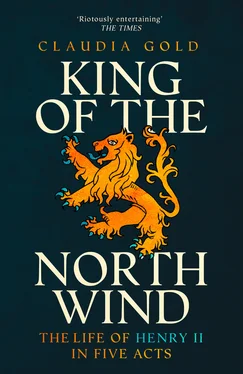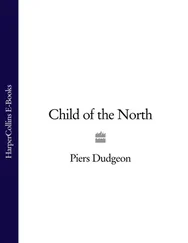1 ...6 7 8 10 11 12 ...24 Henry’s birth meant everything to his maternal grandfather. Thirteen years after William Atheling had drowned, taking with him Henry I’s desires for the succession of England and Normandy, a legitimate male child was born into the family. Both Matilda and her father gave gifts and money to the church to mark their thankfulness and their joy.44
Matilda kept Henry with her during his infancy. In August 1133 she left Geoffrey in Anjou, taking five-month-old Henry with her to Rouen, to join the old king when he returned to Normandy. Now she devoted herself to learning statecraft from her father to prepare for her accession. Matilda’s experience in Germany had been limited to the duties required of a queen consort of a regent. Her father meant to teach her to rule.
King Henry I had another reason for keeping Matilda with him. The chronicler Roger of Howden tells us that the king once again demanded that his reluctant nobles and the archbishops swear to uphold not only Matilda’s claim, but young Henry’s claim too.45 Living in her father’s court meant that Matilda, her baby son and the Anglo-Norman nobility got to know one another better, presumably – in the king’s mind – smoothing the way to her future succession. Matilda may have met some of them when she was a child, but as she had left England when she was only eight years old, strong relationships and loyalties had not been formed. Now the king determined to rectify this.
Matilda had arrived in Normandy pregnant. Her second child, Geoffrey, was born in Rouen at the beginning of the summer of 1134. It was a difficult birth, and Matilda did not expect to survive; she even wrote her will. King Henry showed his daughter tenderness throughout her illness. He delayed his plans to leave and stayed with her until she was well, ‘rejoicing in his grandsons’.46 Henry I no longer had any doubts about the succession. He had his daughter and his grandsons close, and may even have asked his nobles and churchmen to swear allegiance to her yet again.47
By September of the following year, however, father and daughter’s relationship had deteriorated. Matilda’s dowry had included the castles of Exmes, Argentan and Domfront, which lay on the border between Normandy and Anjou, but the king, anxious to retain power, refused to hand them over. Now Matilda and Geoffrey demanded them with immediate effect: Geoffrey argued that he would need them to secure Normandy after Henry I’s death and wanted to take possession as quickly as possible. It is likely that the old king’s refusal to give them up had rankled with Geoffrey for some time. He already faced intermittent threats from his own bellicose barons, and it made sound military sense to hold these castles sooner rather than later. Matilda and Geoffrey also urged Henry I to return to William Talvas, one of Geoffrey’s vassals, his father’s castles in Maine.
Talvas was the son of a notoriously barbarous and seditious Anglo-Norman lord, Robert of Bellême, who had briefly harboured William Clito. Even in an age of warfare and violence, Robert’s savagery attracted note: Orderic Vitalis called him ‘unequalled for his iniquity in the whole Christian era’. Henry I, however, had locked him away not for his cruelty, but for his continuous rebellion. The king captured him in 1112, and he remained his prisoner until Robert died nearly twenty years later, in about 1130. Urged by Geoffrey, Talvas asked the old king for his castles of Sées, Almenêches and Alençon back. Geoffrey and Matilda pushed their luck with an outrageous demand that King Henry swear an oath of fealty to them for the castles in Matilda’s dowry – Henry, furious, refused both requests.48 He exiled William Talvas from Normandy, and went to war with his daughter and son-in-law.
The chroniclers, either eyewitnesses or relying on eyewitness accounts, charged Matilda with causing the war that erupted between her husband and father. Robert of Torigni accused her of deliberately causing trouble, of artfulness, and of detaining the king ‘with various disagreements, from which arose several rounds for argument between the king and the count of Anjou’.49 The chronicler and historian Henry of Huntingdon placed the fault entirely with Matilda for stoking the argument; but Henry I and Geoffrey were hardly blameless. The old king had refused to hand over Matilda’s dowry, while Orderic Vitalis accused Geoffrey of avarice, claiming that he ‘aspired to the great riches of his father-in-law and demanded castles in Normandy, asserting that the king had covenanted with him to hand them over when he married his daughter’.50
We do not know how much pressure Geoffrey put on Matilda to side with him against her father. Nevertheless she was forced to choose, and she chose her husband. It is possible that Matilda had softened towards Geoffrey when she was so ill following the birth of her second son. Instead of giving gifts to a Norman foundation as she lay in fear for her life, she chose an Angevin one – Le Mans – and donated costly curtains and tapestries.51 She may have decided between her husband and father already. Now, she left Normandy with her baby sons to join Geoffrey in Angers.
The border war was vicious. Orderic Vitalis, giving us a human and sympathetic portrait of the old king, wrote that Henry ‘took it very hard’ when Geoffrey besieged another of Henry’s sons-in-law, Roscelin, viscount of Sainte-Suzanne, husband of Henry’s illegitimate daughter Constance.52
The war showed that this was not a normal, loving family. Personal relationships were sacrificed to territorial ambitions, and Matilda and Geoffrey were not prepared to wait until the king’s death to claim Matilda’s dowry.
By late autumn the king and his daughter were still not speaking. Perhaps to alleviate his anger and disappointment, King Henry went hunting at one of his favourite spots, Lyons-la-Forêt. On 25 November at supper he ate too many lampreys, a jawless fish and delicacy which his doctor had advised him not to touch. He became mortally ill. Although the sources differ as to what he actually said over the following days, all agree that he was lucid and aware that death was coming.
Three days later he sent for his confessor Hugh, archbishop of Rouen, and arranged for his burial in Reading Cathedral. The king also had his most powerful magnates and protégés, including William of Warenne earl of Surrey, the Beaumont twins – Robert of Leicester and Waleran of Meulan – and his eldest and beloved bastard son, Robert of Gloucester, at his bedside. He made them promise not to desert his body, but to accompany it to burial. But during his final bleak days, did he discuss the succession?
As far as we are aware, nothing was written down at this time. The historian William of Malmesbury claimed that, ‘when he was asked … about his successor he assigned all his lands on both sides of the sea to his daughter in lawful and lasting succession, being somewhat angry with her husband because he had vexed the king by not a few threats and insults’.53 Matilda’s biographer Marjorie Chibnall speculates that before their argument, perhaps the king had intended Geoffrey and Matilda to rule together. But now he reserved his bile for his son-in-law. His wishes were clear: Matilda would rule alone.54
But the anonymous author of the Gesta Stephani (‘The Deeds of Stephen’) claimed that during his final hours, the king performed a volte-face. He was so incensed with Matilda and Geoffrey for their audacious request that Henry pay them homage, and for the war, that he freed his magnates from their oaths of loyalty to his daughter, and repented ‘the forcible imposition of the oath on his barons’.55 John of Salisbury, the brilliant cleric, polymath, diplomat and writer, made a similar claim; he repeated the story told by Hugh Bigod, Henry I’s steward, of a deathbed change of heart.56 The tale appeared in other trustworthy sources.
Читать дальше












